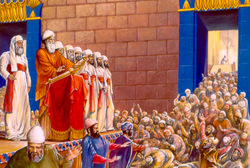This week we begin exploring Ezra-Nehemiah, which was a single document back in the day, but which we have divided into two because our attention spans are very, very short.
Ezra was a scribe, priest, and acting mayor who led one of the groups of returnees back from Babylon to Jerusalem. The first half of the Book of Ezra is all about his efforts to rebuild the temple, while the second half is about rebuilding community–a much more difficult task.
One sticking point is that many Jewish men had taken foreign wives during the decades of exile in Babylon. Some of these women had come back from Babylon with them to rebuild Israel. But when Ezra set about rebuilding the community, he became concerned that these women’s presence would anger Yahweh. He fasted and prayed for three days and laid out the problem to the people (read: the men), who decided that the women needed to go home, stat.
Some commentators are quick to note that it wasn’t mere foreignness that got these women a one-way ticket back to Babylon. The Bible, they say, is full of injunctions to be kind to aliens (not the green interplanetary kind). Moreover, the whole book of Ruth is about how a foreign woman, who is from Moab no less (not the skateboarding mecca) was in King David’s direct ancestral line.
No, it was religion, not ethnicity, that was the crux of the issue. Ruth willingly gave up her religion so she could remain in Israel (“your people will be my people, and your god my god”). So in that case, marrying a shiksa carried no particular censure for Boaz, the bachelor who rescued Ruth from the threshing room floor. In Solomon’s case, however–and Ahab’s, and many other kings’–marrying a foreign woman introduced Very Bad Things into holy worship. Those women didn’t give up their religion, but tried to introduce their own practices into Israelite worship. That never ended well, because Baal and Yahweh weren’t exactly BFFs.
The problem with this argument is how short-sighted it is from a justice perspective. Whatever the religious persuasion of the foreign wives in the Book of Ezra-Nehemiah, the fact remains that the people of Israel basically threw them under the bus. At the beginning of chapter 10 the people vow to renew their covenant with Yahweh: “Now let us make a covenant before our God to send away all these women and their children…”
Excuse me, their children? It takes two to tango, people. Those are your children too! And it wasn’t that they were exactly given fare to catch the next bus home to Babylon. No, these women and children were banished with little hope of survival, thrown to the wilderness. In her commentary Ezra, Nehemiah, and Esther, Johanna W.H. Van Wijk-Bos writes:
Many of them, especially those who had no family circle to return to, would perish because they lacked the necessary means to sustain their existence. There is no excuse for it, and there is no precedent for it in the laws anywhere. Rather, the laws of Torah demand protection and care for strangers in all the different law codes. (p. 47)
A kinder, gentler ethnic cleansing? I’m not so sure.
Sat 11/27
#Twible Ezra 4: Yes, we rec’d your application to help rebuild the temple & play in our sandbox, but your blood’s impure. Denied.
Sun 11/28
#Twible Ezra 5: Oh crap. We can’t find that old building-permit-edict-thingy from Cyrus. Construction workers play canasta till it turns up.
Mon 11/29
#Twible Ezra 6: Darius not only permits the rebuilding of the Jewish temple, he foots the bill. Oh, and can you throw in a few Persian rugs?
Tues 11/30
#Twible Ezra 7: Ezra does double duty as priest AND scribe. But he’s not too busy to also serve as acting mayor. Desperate times, you see.
Wed 12/1
#Twible Ezra 8: Most Levites prefer being 2nd-class citizens in Bab to 2nd-class citizens at home, even when Ezra promises 40 acres + mule.
Thurs 12/2
#Twible Ezra 9: Confronted w/problem of foreign wives, Ezra prays, mourns, & appoints a committee to study the issue. Very Presbyterian.
Fri 12/3
#Twible Ezra 10: People are so moved by Ezra’s prayer that they banish foreign wives & kids w/o so much as bus fare. Hasta la vista, babies.
Tune in every Friday to Flunking Sainthood for weekly Twible commentary.


